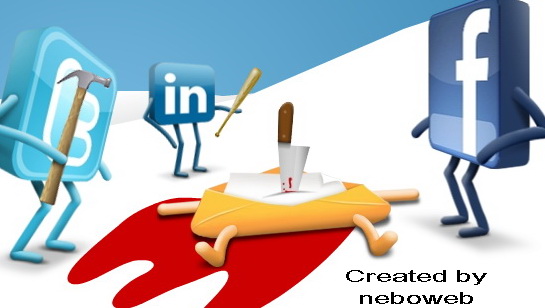
“Is email dead?” This is a question asked by marketing experts year after year as they examine new technologies and innovations in the digital advertising world. I mean, surely it must be, with Facebook, Twitter, Pinterest, Instagram, MySpace, Foursqaure, mobile, tablet, display media, PPC, video and everything else NOT email occupying our brains every second of the day. Isn’t email just a tool for us to communicate to our clients, colleagues, friends and family? How could something so intimate and direct be a viable advertising strategy in this day and age?
In fact, the intimate nature of email is what makes it so valuable in an increasingly complex digital world.
Your inbox is one of the only remaining virtual realms when you can assert any semblance of control. Your Twitter feed is likely obnoxiously covered with “promoted Tweets” or some such nonsense, the advertising on your Facebook feed comes through from brands, sponsored posts, and ads along the sides, and even your YouTube queries are covered in paid videos that have no relevance to your search terms. Outside of the inbox, our digital avenues are fraught with noise we did not choose and probably will not hear.
Email is a special exception. With the CAN-SPAM laws enacted by the U.S. in 2003, email has become a very tightly controlled form of permission-based communication with increasingly intense consequences for bad behavior. Essentially, if you did not choose to receive a message, there is no legal footing upon which a sender can deliver that message.
It is the choice to receive communication from a company that makes email such a particularly powerful tool. The consumer has determined that not only is your brand or offering something relevant to their personal life, but they have allowed you to contact them in a highly personal way. One possible misstep – sending too many messages, offering irrelevant or worthless content, making the unsubscribe button hard to find – and you could wind up marked as SPAM. Too many SPAM complaints, and you could be blacklisted by Yahoo. And that puts a huge damper on your relationships with Gmail, Hotmail, and Facebook (and many, many others).
Because of the myriad ways an email campaign can go wrong, marketers take precise steps to detail their email strategies, obey national legislation, and follow best practices. In a nutshell, if you do these things, you’ll be in the clear:
1) Be truthful. In your subject line, in your “from” address, and in your body content.
2) Include a physical address. So the Feds can hunt you down if need be. (Kidding! Well, not really.)
3) Honor unsubscribes. Legally, within 10 days of the unsub. Also, make it easy for the recipient to find this.
4) Make your email relevant. Utilize collected data. Target your content to the specific consumer.
Unfortunately, juggling strategy, legality, and campaigns for your entire email program, on top of everything else, can be exhausting and difficult. Luckily, a company like Booyah can help you out if you’re looking for advice, ongoing consultation, or a ground-up reworking of your email program. As a one-stop-shop digital agency, we can incorporate email into our multi-pronged approach to make your digital marketing a smashing success.



